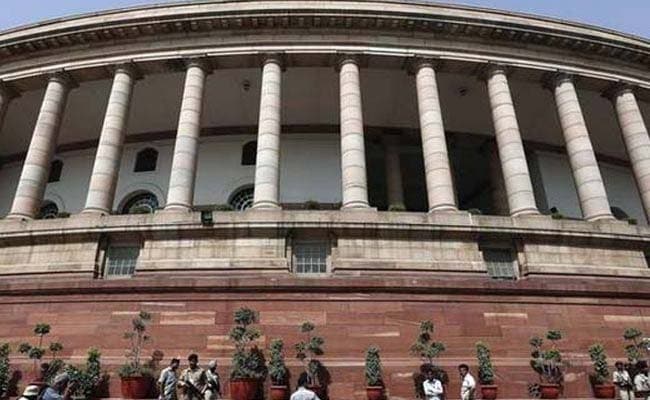
The amended bill will be tabled in Parliament after the cabinet approval, said a senior HUPA Ministry official. (Parliament of India File Photo)
New Delhi:
The government is gearing up to ensure the passage of the crucial real estate bill, which is aimed at curbing malpractices in the sector and bringing transparency through regulatory mechanism, in the forthcoming Winter session of Parliament.
The Housing and Urban Poverty Alleviation (HUPA) Ministry has accepted all the amendments proposed by the Rajya Sabha Select Committee in the Real Estate (Development and Regulation) Bill, 2013, and is readying to move the amended legislation for the cabinet's approval.
The amended bill will be tabled in Parliament after the cabinet approval, said a senior HUPA Ministry official.
The bill seeks to set up a regulatory framework that will govern contracts between home buyers and sellers. A regulator to curb malpractices in the real estate sector, which is one of the biggest sinks of black money, was long overdue.
As per the amendments proposed by the Select Committee, there will be parity in the interest payable by consumer and developer in case of any default by either. At present the scales are tilted heavily against the consumers.
The developers pay only 2 to 3 per cent interest in case of default on their part but the consumer pays 16-18 per cent interest for his/her default. The Rajya Sabha panel said in its report that "the interest rate payable by the promoters as well as by allottees shall be same in eventuality of any default by either of them."
The Select Committee has also recommended that 50 per cent of payments made by home buyers for a real estate project be kept in a separate account and used for that specific project only.
In addition to penalty provisions of up to three years' imprisonment proposed by the government, the committee introduced imprisonment clause for a realtor failing to abide by the orders of the appellate tribunal.
The real estate bill was introduced by the UPA government in 2013. It was then referred to the Parliamentary Standing Committee in September 2013. The committee submitted it report in February 2014, following which the cabinet considered the amendments in December 2014.
The government tried to push the bill in the budget session in April but the opposition forced it to refer the bill to a Rajya Sabha Select Committee in May. The Select Committee submitted its report in July.
The Housing and Urban Poverty Alleviation (HUPA) Ministry has accepted all the amendments proposed by the Rajya Sabha Select Committee in the Real Estate (Development and Regulation) Bill, 2013, and is readying to move the amended legislation for the cabinet's approval.
The amended bill will be tabled in Parliament after the cabinet approval, said a senior HUPA Ministry official.
The bill seeks to set up a regulatory framework that will govern contracts between home buyers and sellers. A regulator to curb malpractices in the real estate sector, which is one of the biggest sinks of black money, was long overdue.
As per the amendments proposed by the Select Committee, there will be parity in the interest payable by consumer and developer in case of any default by either. At present the scales are tilted heavily against the consumers.
The developers pay only 2 to 3 per cent interest in case of default on their part but the consumer pays 16-18 per cent interest for his/her default. The Rajya Sabha panel said in its report that "the interest rate payable by the promoters as well as by allottees shall be same in eventuality of any default by either of them."
The Select Committee has also recommended that 50 per cent of payments made by home buyers for a real estate project be kept in a separate account and used for that specific project only.
In addition to penalty provisions of up to three years' imprisonment proposed by the government, the committee introduced imprisonment clause for a realtor failing to abide by the orders of the appellate tribunal.
The real estate bill was introduced by the UPA government in 2013. It was then referred to the Parliamentary Standing Committee in September 2013. The committee submitted it report in February 2014, following which the cabinet considered the amendments in December 2014.
The government tried to push the bill in the budget session in April but the opposition forced it to refer the bill to a Rajya Sabha Select Committee in May. The Select Committee submitted its report in July.
Track Latest News Live on NDTV.com and get news updates from India and around the world

